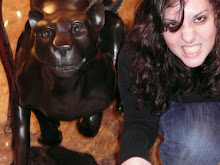It took me a few reads of the first part of this to really understand how I felt about this piece. Somewhere in the middle is a transition that occurs that makes Eurydice a much more interesting and compelling character. I did not enjoy the first part of this at all. The second, however, I was very drawn to.
At first, Orpheus and Eurydice seem scattered, uninteresting characters with no depth. Then, as they begin interacting with the underworld, the transition happens. It is as though relearning all the information about her life has made it more important to her. However, at the end, she abandons both her father and her husband. The ideas and morals in this story are very compelling, but I found Eurydice to not be worthy of such a profound story as a character.
However, the Greek Chorus is a really interesting thing to interact with, especially as a playwrite. They are characters that are both narrators (and thus outside the story and omniscient), yet they interact with the characters and help guide them. It is only in Greek theatre that this kind of overlap is possible, and it allows for the characters to directly interact with the story itself, because they seem to break the rules of the story that the Stones dictate. I wonder how we could adapt this into different types of narrators for types of theatre other than this.
As much as I disliked the character of Eurydice, I think she grows the most in the play. This is very much a coming of age story for her, and the progression she goes through of relearning everything from the ground up is a very nice build to climax. I also liked how the climax of the piece was not when she is sent back to her second death, but rather, when she gets there, and she goes through her second mourning of her father. This is a very philosophical and gripping idea, and that was really the aspect of the story that struck me most.

Okay, good, so how does that help you write? Misplaced/off-placed climax, doubled themes (you name abandonment and death here -- there are lots of others), huge character shifts, underweighted characters, a chorus, an unclear opening. What of that works for you and how? What doesn't and why? How can you recreate what works (and avoid what doesn't)?
ReplyDeleteYou also write about the chorus, "It is only in Greek theatre that this kind of overlap is possible....I wonder how we could adapt this into different types of narrators for types of theatre other than this." First off, this really isn't Greek theater, so how is it working here? Or isn't it? And how might you modify it to use what it buys in your own writing? I like the idea of chorus as narrator -- tell me (or, you know, show me) how.
I think it's pretty interesting that you mark this as a coming-of-age story, given that Eurydice is a character who is dead. You're right, though, it's fairly typical of that sort of narrative: young girl starts out being somewhat naive; she goes through a traumatic event; she has to pick up the pieces and reassemble herself afterwards. Despite being dead.
ReplyDeleteI too love the "character" of the chorus. You hit the nail on the head; they are in the unique position of being both outside as the narrator (yay directed exposition!) and fully incorporated into the story (yay character interaction!) But why do you feel like this is limited to Greek theatre? Take it, spin it, make it your own. Ruhl made her chorus rocks, make yours wedges of cheese! or whatever. maybe not cheese. but also, why not?
ReplyDeleteOne thing to keep in mind is that this play is only one interpretation of the Orpheus myth among many, so what you see in Eurydice here is just one direction it can be taken. One experiment that might be useful is to think "how would I write Eurydice to be more compelling?" Adaptations are not to be constrained to one form of the story, they can take so many different shapes.
ReplyDelete